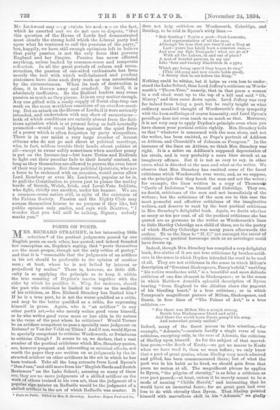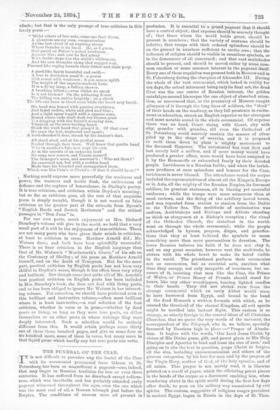POETS ON POETS.
MRS. RICHARD STRACHEY, in her interesting little selection* of the poetical judgments passed by our English poets on each other, has quoted, and indeed founded her conception on, Dryden's saying, that "poets themselves are the most proper, though not the only critics of poetry," and that it is "reasonable that the judgments of an artificer in his art should be preferable to the opinion of another man ; at least, where he is not bribed by interest or prejudiced by malice." There is, however, no little diffi- culty in so applying the principle as to keep it within the true meaning of Dryden's maxim together with the rider by which he qualifies it. Why, for instance, should the poet who criticises be limited to verse as the medium of his criticism, as Mrs. Richard Strachey has limited him P If he is a true poet, he is not the worse qualified as a critic, and may be the better qualified as a Critic, for expressing himself in prose. Again, who is "an artificer" in any other poet's art,—he who merely writes good verse himself, or he who writes good verse more or less akin in its nature to the verse of the poet whom he criticises P Would Turner be an artificer competent to pass a specially sane judgment on Rubens P or Van der Veldt on Titian? And if not, would Byron be specially competent to criticise Wordsworth, or Swinburne to criticise Clough ? It seems to us, we declare, that a vast number of the poetical criticisms which Mrs. Straohey quotes, are, however pungent and interesting as satirical efforts, not worth the paper they are written on as judgment's by the in- structed artificer on other artificers in the art in which he has been trained. Take all the long extracts from Lord Byron's "Don Juan," and still more from his "English Bards and Scotch Reviewers" on the Lake School ; amusing as many of them are, they are no more judgments of a skilled artificer on the work of others trained in his own art, than the judgment of a popular sign-painter on Raffaelle would be the judgment of a skilled artificer in the art of which Raffaelle was master. It
• roots on Poets. Edited by Mrs. R. Strachey. London : Kogan Paul and Co.
does not help criticism on Wordsworth, Coleridge, and Southey, to be told in Byron's witty lines :—
"Bob Southey You're a poet—Poet-Laureate, And representative of all the race,
Although 'tis true net you turn'd out a Tory at Last—yours has lately been a common case,— And now my Epic Renegade ! what are ye at P With all the Leiters, in and out of place P A nest of tuneful persons, to my eye Like 'four-and-twenty Blackbirds in a pye;
Which pye being open'd they began to sing' (This old song and new simile holds good), ' A dainty dish to set before the King."
Nothing could be wittier, but it helps us even bass to under- stand the Lake School, than Lord Jeffrey's criticism on Words- worth's "Thorn-Tree," namely, that in that poem a woman' in a red cloak went up to the top of a hill and said " Oh,' Misery," and then came down again. Lord Jeffrey was very far indeed from being a poet, but he really taught us what' ordinary mankind thought of Wordsworth's deep sympathy, with the keen sufferings of coarse humanity, and Lord Byron's persiflage does not even teach ns as much as that. Moreover, it is not very easy to apply Dryden's principle even when you' have chosen your poetical critics rightly. Mrs. Strachey tells us that "whatever is concerned with the man alone, and not the writer, has been omitted, as Pope's portrait of Addison as Atticus, and Churchill's of Johnson as Pompom)." In the, instance of the lines on Attica's, we think Mrs. Strachey was right. It is a satire on Addison's supposed depreciation of his rivals, and is very probably a mere blow struck at an imaginary offence. But it is not so easy to say, in other cases, what is directed at the man and what at the writer. We observe that Mrs. Strachey has omitted some of the finest criticisms which Wordsworth ever wrote, and, as we suppose, on the principle that they touch the man and not the writer ; for example, the lines written in a copy of Thomsonie "Castle of Indolence" on himself and Coleridge. They are, no doubt, criticisms of the men and not immediately of the writers ; but the criticisms of the men are in this case the most powerful and effective criticisms of the imaginative writers, and deserve to rank by the best poetical criticisms in Mrs. Strachey's delightful book. Again, we doubt whether so many as ten per cent. of all the poetical criticisms she has quoted are as germane to the writer as Wordsworth's lines to little Hartley Coleridge as a child of three, are to the poetry of which Hartley Coleridge was many years afterwards the author. To us the lines to "H. C." are amongst the rarest of eriticisms,—a poetical horoscope such as no astrologer could have drawn up.
Indeed, though Mrs. Strachey has compiled a very delightful book, five-sixths of it are not true criticisms by brother-artifi- cers in the sense in which Dryden intended the word to be used at all. They are not criticisms in the sense in which Milton's description of "Sweetest Shakespeare, Fancy's child," warbling "his native woodnotes wild," is a beautiful and moat delicate criticism of one fine element in Shakespeare; or in the sense in which Matthew Arnold's splendid description of Byron bearing "from England to the ..tolian shore the pageant of his bleeding heart," is a true criticism ; or in which Tennyson's magnificent picture of Milton, Shakespeare, and Dante, in four lines of "The Palace of Art," is a true criticism :- " For there was Milton like a seraph strong, Beside him Shakespeare bland and mild ;
And there the world-worn Dante grasp'd his song, And somewhat grimly smiled."
Indeed, many of the finest poems in this selection,—for example, "Adonais,"—contain hardly a single verse of true criticism, excepting only, in the case of Adonais, the criticism of Shelley upon himself. As for the subject of that marvel- lone poem,—the 'death of Keats, we get no nearer to Keats when we have read it, than we were before ; we only know that a poet of great genius, whom Shelley very mush admired and pitied, has been commemorated there; but of what the poet was in his habit as he lived, we should gain from that poem no notion at all. The magnificent phrase he applies to Byron, "the pilgrim of eternity," is as false a criticism as ever poet passed,—at least, unless it be merely meant to be a mode of naming " Childs Harold," and intimating that he would have an immortal fame ; for no great poet had ever less to do with eternity than Byron. That Shelley painted himself with marvellous skill in his "Adonais," we gladly admit ; but that is the only passage of true criticism in this lovely poem :— " 'Midst others of less note, came one frail Form,
A phantom among men, companionless As the last cloud of an expiring storm
Whose thunder is its knell. He, as I guess,
Had gazed on Nature's naked loveliness Actaeon like; and now he fled astray °- With feeble steps o'er the world's wilderness, And his own thoughts along that rugged way,
Pursued like raging hounds their father and their prey.
A pard•like Spirit beautiful and swift—
A love in desolation mask'd—a power (girt round with weakness ; it can scarce uplift The weight of the superincumbent hour.
It is a dying lamp, a falling shower, A breaking billow;—even whilst we speak Is it not broken P On the withering flower
The killing sun smiles brightly : on a cheek
The life can burn in blood even while the heart may break.
His head was bound with pansies overblown, And faded violets, white and pied and blue ; And a light spear topp'd with a cypress cone, Round whose rude shaft dark ivy-tresses grew
1-4 t dripping with the forest's noonday dew,
Vibrated, as the ever-beating heart Shook the weak hand that grasp'd it. Of that crew He came the last, neglected and apart ;
A herd-aba,ndon'd deer, struck by the hunter's dart.
All stood aloof, and at his partial moan
Smiled through their tears. Well knew that gentle band
Who in another's fate now wept his own. As in the accents of an unknown land He sung new sorrow, sad Urania scann'd
The Stranger's mien, and murmur'd : 'Who art thou ? '
He answered not, but with a sudden hand Made bare his branded and ensanguined brow,
Which was like Cain's or Christ's-0 that it should be so!"
Nothing could express more powerfully the weakness and power, the wanness and hectic flush, the enthusiasm of defiance and the rapture of benevolence, in Shelley's poetry. It is true criticism, and criticism within Dryden's meaning; but so far as criticism goes, all the rest of that exquisite poem is simply naught, though it is not wasted on false criticism as the greater part of the extracts from Byron's "English Bards and Scotch Reviewers" and the critical passages in "Don Juan" is.
, For our own parts, much enjoyment as Mrs. Richard Strachey's volume will give to the world, we hold that a very small part of it will be the enjoyment of true criticism. There are not many poets who have given their minds to criticism, at least to criticism in verse. Matthew Arnold did ; Mr. Watson does ; and both have been splendidly successful. There is no finer criticism in the English language than that of Mr. Watson's " Wordsworth's Grave," of his ode on the Centenary of Shelley ; of his poem on Matthew Arnold himself, and on the death of Tennyson. But for the moat part, poetical criticism by English poets has not been very skilful in Dryden's sense, though it has often been very witty and brilliant. But though some (not quite all) of Mr. Arnold's best poetical criticism on English poets has been included in Mrs. Strachey's book, she does not deal with living poets, and so has been obliged to ignore Mr. Watson in her interest- ing volume. For ourselves, we should have preferred even to this brilliant and instructive volume,—often most brilliant where it is least instructive,---a real selection of the beat criticism, whether in verse or in prose,—whether by dead poets or living, so long as they were true poets, on either themselves or on other poets in whose writings they were deeply interested. Such a selection would be entirely different from this. It would retain perhaps some thirty out of these three hundred pages, and give us some four or fax hundred more, some of them in verse, but many more in that liquid prose which hardly any but true poets can write.







































 Previous page
Previous page